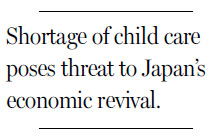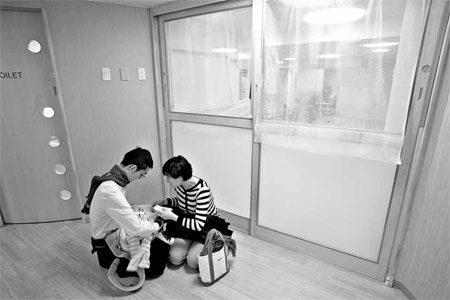Mothers in Japan endure desperate hunt for day care
Updated: 2013-03-17 08:36
By Hiroko Tabuchi(The New York Times)
|
|||||||
|
Ayaka Okumura, with her husband Masanori and daughter Ayane, experienced a grueling search for day care. Kosuke Okahara for The New York Times |

TOKYO - Ayaka Okumura was barely pregnant when she began fretting over how she would hold on to the management job that would have been out of reach just a generation ago.
From the start, Ms. Okumura had a crucial advantage over the many American women who despair of "having it all." The Japanese government subsidizes thousands of day care centers nationwide for families of all income levels, and it demands that caregivers pass rigorous exams in child care that usually require two years of special schooling.
But the quality of the public day care network - and a growing shortage of slots as more women entered the work force - has created its own set of seemingly intractable problems. Increasingly desperate women are forced into an annual competition for day care slots that is grueling enough to merit its own name, "hokatsu."
For months, Ms. Okumura, then 30, trudged from day care center to day care center, some public and some private, putting her name on waiting lists that were sometimes 200 names long.
By the time she gave birth to her daughter, Ayane, late last year, she had toured 44 sites in Tokyo.
"I'm going to lose my mind," she said one day. "Why does finding day care have to be this difficult?"
In rapidly aging Japan, such worrying is no longer limited to parents. Some government officials have begun to label the shortage of day care spots a crisis that threatens to undermine attempts to re-energize Japan's listless economy by keeping its large pool of young, highly educated women from paychecks that could help increase domestic spending.
More worrisome, experts say, is that a lack of openings could convince more women that they should forgo having more than one child or have no children at all, depressing a birthrate that is already among the lowest in the world.
But with a public debt more than twice the size of its economy and a concentration of public spending on the growing ranks of elderly Japanese, it is unlikely that the problem will be fixed soon.
At the root of the problem, women's rights advocates say, is that working mothers now face two levels of hurdles: a new demographic trend that works against them and an old bias toward stay-at-home mothers. Ms. Okumura made most of her visits to day care centers alone because in Japan fathers generally consider finding child care to be a mother's responsibility.
"I get asked: Is your work so important that you have to put your baby in child care? Why are you being so self-centered?" said Mariko Saito, who works for a pharmaceuticals company in Tokyo. "But I'm not working for myself. I'm working to support my family, just like my husband."
When Japan set up its modern public day care system after World War II, the authorities expected it to serve people who might have nowhere else to turn, like single mothers.
But with the bursting of the "bubble economy" in the early 1990s, young men found it harder to secure stable, high-paying work. Wives who stepped into the breach began to push the boundaries of employment, finding jobs they were less willing to part with at the first sign of a baby bump.
And few families feel comfortable with baby-sitting in a culture in which inviting strangers into the home is unusual. Young Japanese mothers turned instead to the government-subsidized child care centers, where their collective needs led to a nationwide waiting list that is now more than 25,000 places long. Even private day care, which can be twice as expensive, is oversubscribed.
During Ms. Okumura's "hokatsu," she first applied to her local government, which uses a point-based rating system to try to ensure everyone has an equal shot at subsidized day care. She and her husband, Masanori, received a perfect base score because they both have full-time jobs. Single-parent households earn extra points as do those with special-needs children, but the Okumuras at least lost no points. Having grandparents nearby would have been a handicap. Still, officials told them their chances were slim.
Shinzo Abe, the new prime minister, has promised to create new day care centers, but it is unclear how much he can accomplish given Japan's growing and politically active elderly population. Almost 70 percent of Japan's social welfare spending is directed at people 65 or older, while less than 4 percent supports children and families, according to a government research group.
"It's become a vicious cycle," said Hiroki Komazaki, the founder of several nurseries. "We don't invest in future generations, inevitably bringing on an aging society."
In the end, Ms. Okumura got lucky, recently winning a coveted public day care spot. But she cannot yet bring herself to accept it.
"I wish I could stay with my daughter for longer," she said. "I'm filled with so much worry, and completely spent."
The New York Times
(China Daily 03/17/2013 page10)
